Game wide with the ROG Strix XG49VQ
Anyone who uses more than one monitor will tell you that there’s no going back. Doubling your on-screen real estate is great for productivity, and it’s a surefire way to make games feel more immersive. The only downside to playing across a pair of displays is the bezel between them, which breaks up the action in a show-stopping way.
ROG’s Strix XG49VQ gives you the sweeping panoramas of two 27” monitors, side by side, in a curved, ultra-wide 49” form factor. Its 3840x1080 resolution is a thing of beauty, enhanced by dynamic refresh rate technology that tops out at 144 Hz and DisplayHDR 400 certification for more lifelike high dynamic range.
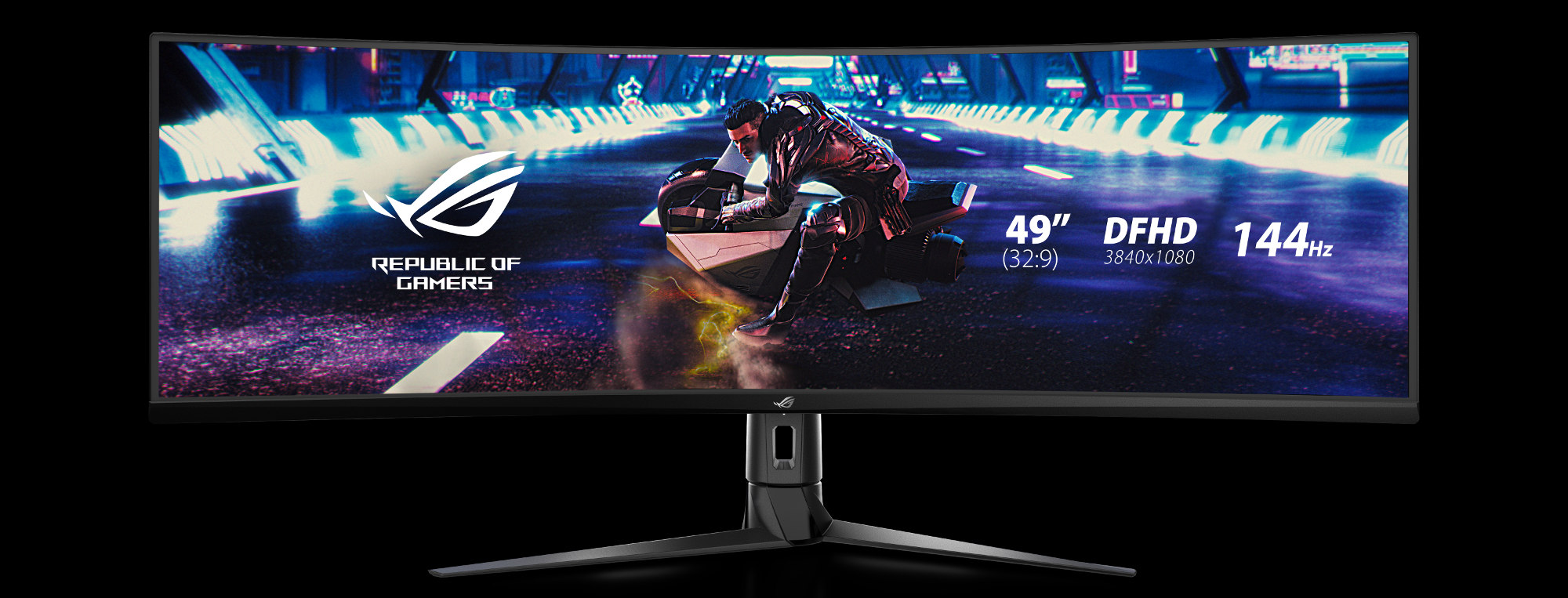
Width-wise
The XG49VQ exemplifies a whole being greater than the sum of its parts. Not only does it eliminate the bezel that’d split your screen in a dual-monitor configuration, but it also adds an 1800R curvature to wrap around your head in a way a flat panel can’t. Curvature isn’t just an aesthetic extra. It actually creates a more comfortable viewing experience for your eyes to focus on, improving immersion and minimizing distortion. That 1800R rating reflects a monitor radius of 1,800mm. So, the XG49VQ’s aggressive curve is ideal for viewing from 1.8 meters away or less.
Color consistency is another advantage of using one ultra-wide monitor instead of two smaller displays side by side. Have you ever tried to get the output from a pair of monitors to match exactly? Without calibration equipment and a free afternoon to fine-tune settings, it’s immensely difficult to achieve an exact match. The Strix XG49VQ instead gives you one uniform surface on which to work or play.

Convenience begets productivity
Multi-monitor setups are great for organizing windows in a way that keeps information readily accessible without needing to tab between them. You may have a chat application up on one screen while gaming on the other. Or maybe you keep your word processor running on the left display and a web browser full of research on the right. As you might imagine, the 49” XG49VQ similarly provides ample space for you to drag and park multiple windows without overlap.
In addition to DisplayWidget, which allows users to arrange multiple windows without overlap using MultiFrame, support for Picture-by-Picture (PbP) on the XG49VQ allows you to view content from up to three sources at once, side by side, as if you had a trio of bezel-less monitors in front of you. The XG49VQ includes hotkeys for a variety of PbP arrangements, so you can toggle through preset layout options to get the best fit.
Display input options on the XG49VQ include two HDMI 2.0 ports and one DisplayPort 1.2 connector, all of which support AMD’s FreeSync 2 HDR technology. There’s also a 3.5mm audio jack, a pair of USB 3.0 Type-A ports, and an upstream USB 3.0 Type-B port. Although most gamers use a headset for accurately placing sounds and communicating with teammates, the XG49VQ does have stereo 5W RMS speakers for when you want to go headphone-free.
Maximizing performance
An ultra-wide monitor with a monstrous resolution and 144 Hz refresh rate sounds like it’d require an ultra-high-end graphics card to match. However, the XG49VQ is designed to help enable better and more efficient performance from your PC.
Despite its 49” diagonal measurement, the XG49VQ’s 32:9 aspect ratio translates to a total pixel count just over 4.1 million. A standard QHD panel with a resolution of 2560x1440 is composed of nearly 3.7 million pixels, while a 4K display necessitates pushing almost 8.3 million pixels. As you can see, the XG49VQ is much closer to a QHD monitor than its exotic size suggests. A relatively mainstream graphics card should serve up playable frame rates in your favorite games. Higher-end GPUs will take full advantage of the monitor’s silky smooth 144 Hz refresh rate.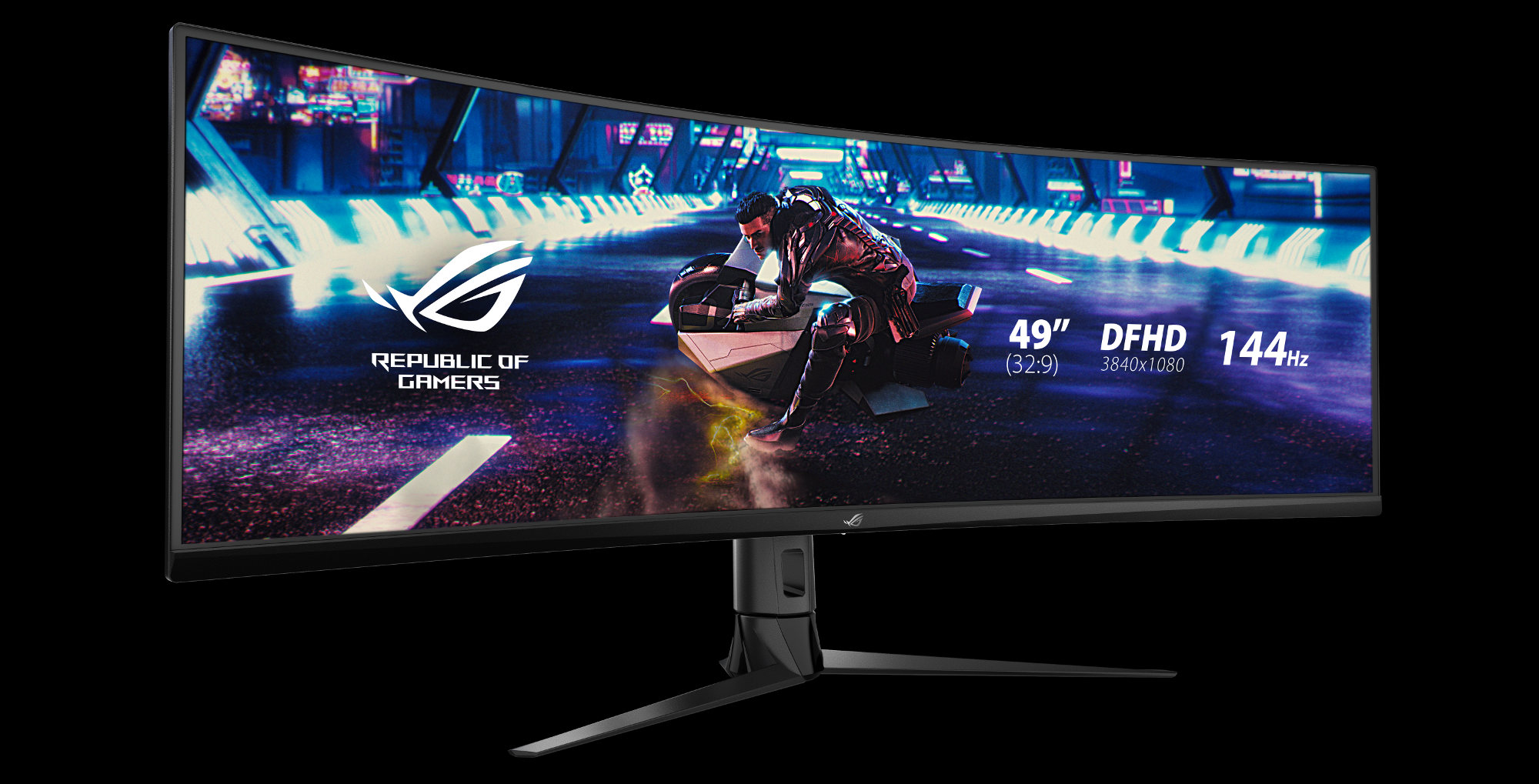 When you pair the XG49VQ with a compatible AMD Radeon graphics card and enable FreeSync, the two components dynamically sync up, marrying the monitor’s refresh to the GPU’s frame rate between 48 and 144 Hz. Aligning those variables means never having to weigh stuttering and input lag against the tearing that happens with Vsync disabled. Below the XG49VQ’s generously wide dynamic refresh range, Low Framerate Compensation (LFC) kicks in to insert additional frames, ensuring the gameplay remains as smooth as possible. LFC is a mandatory feature of AMD’s Radeon FreeSync 2 HDR specification, which the XG49VQ supports. FreeSync 2 HDR also defines requirements for low input latency and high dynamic range tone mapping.
When you pair the XG49VQ with a compatible AMD Radeon graphics card and enable FreeSync, the two components dynamically sync up, marrying the monitor’s refresh to the GPU’s frame rate between 48 and 144 Hz. Aligning those variables means never having to weigh stuttering and input lag against the tearing that happens with Vsync disabled. Below the XG49VQ’s generously wide dynamic refresh range, Low Framerate Compensation (LFC) kicks in to insert additional frames, ensuring the gameplay remains as smooth as possible. LFC is a mandatory feature of AMD’s Radeon FreeSync 2 HDR specification, which the XG49VQ supports. FreeSync 2 HDR also defines requirements for low input latency and high dynamic range tone mapping.
Life in stunning high dynamic range
Beyond its performance-oriented features, the XG49VQ boasts stunning color reproduction and contrast. It covers 90% of the DCI-P3 color space used by the film industry and 125% of the more ubiquitous sRGB gamut. A 4ms gray-to-gray response time speaks to the panel’s snappy pixels and ensures fast motion on-screen won’t be marred by ghosting.
A typical brightness spec of 450 cd/m2 easily satisfies VESA’s DisplayHDR 400 requirement. Certification to the standard also ensures that the XG49VQ delivers 10-bit image processing and strong black level performance.
Multiple HDR modes tailor the XG49VQ’s output to match your content. ASUS Gaming HDR is best applied to your favorite games. It enhances contrast in darker scenes, making it easier for you to perceive hidden details. ASUS Cinema HDR is the yin to ASUS Gaming HDR’s yang, boosting brightness levels to make images clearer in movies or while you’re working on your own multimedia projects.
| ROG Strix XG49VQ | |
|---|---|
| Panel | 49" VA 32:9 aspect ratio 1800R curve |
| HDR | DisplayHDR 400 |
| Refresh rate | FreeSync 2 HDR up to 144Hz |
| Response time | 4 ms (GtG) |
| Colors | 16.7M 97% DCI-P3/99% Adobe RGB gamut coverage |
| Brightness | 450 cd/㎡ (Typical) |
| Contrast | 3000:1 (Typical) |
| Viewing angles | 178°(H) /178°(V) |
| Ports | 1 x DisplayPort 1.2, 2 x HDMI 2.0, 2 x USB 3.0, 1 x 3.5-mm audio |
| Price | $899 USD / $1,199.99 CAD |
| Availability (USA) | Amazon, B&H |
| Availability (Canada) | Canada Computers, Amazon |
Like a hug from your monitor
Switching from a single display to an ultra-wide monitor like the XG49VQ, or even from a dual-screen setup, is breathtaking. When you combine a 49” wingspan with an aggressive 1800R curvature, high dynamic range, and the smoothness of AMD’s FreeSync 2 HDR adaptive refresh technology, games become so much more immersive and desktop productivity gets a shot of adrenaline. The ROG Strix XG49VQ is priced at $899 USD and $1,199.99 CAD. Check with your local ROG representative for availability in your region.
Author
Popular Post
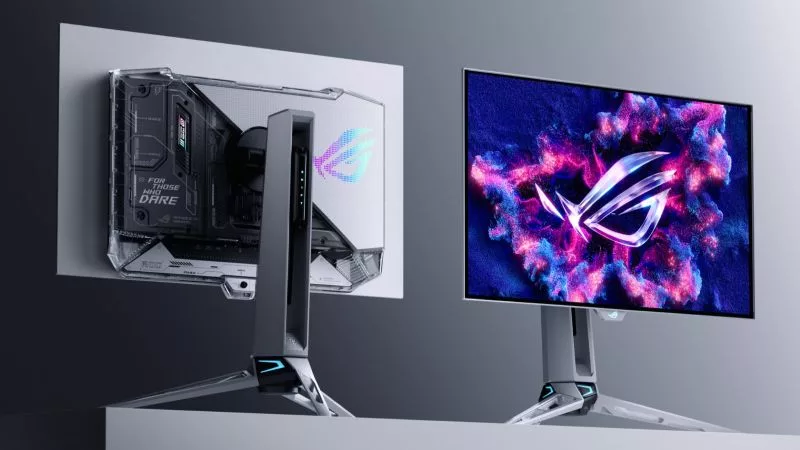
Prepare for Tandem OLED splendor with these new ROG gaming monitors

The best accessories to supercharge your ROG Xbox Ally

Introducing the ROG Xbox Ally and Ally X: ROG and Xbox team up to deliver the best in handheld gaming

What CPU does your PC have? Here’s how to check
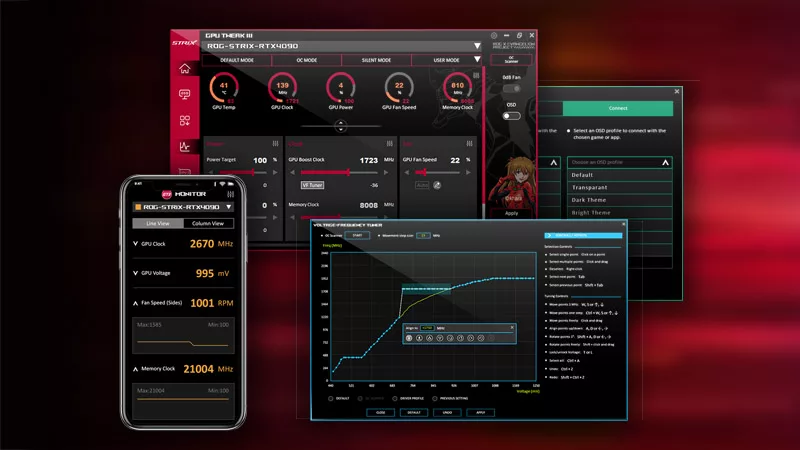
ASUS GPU Tweak III: The ultimate tool for advanced GPU tuning
LATEST ARTICLES

Prepare for Tandem OLED splendor with these new ROG gaming monitors
ROG's monitor game is leveling up with Tandem WOLED tech, a new display coating, and next-gen dual-mode glory.
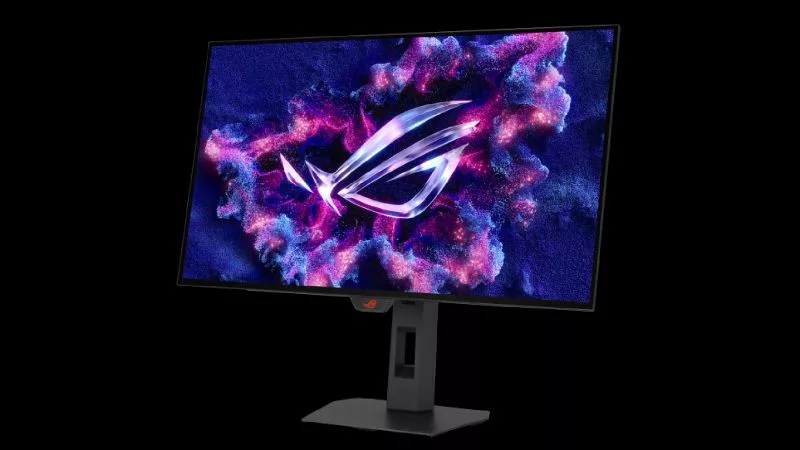
The ROG Strix OLED XG27AQDMG Gen 2 refines an award-winning formula
We've updated this fan-favorite gaming monitor with a new display coating, a more compact base, and a Neo Proximity Sensor.
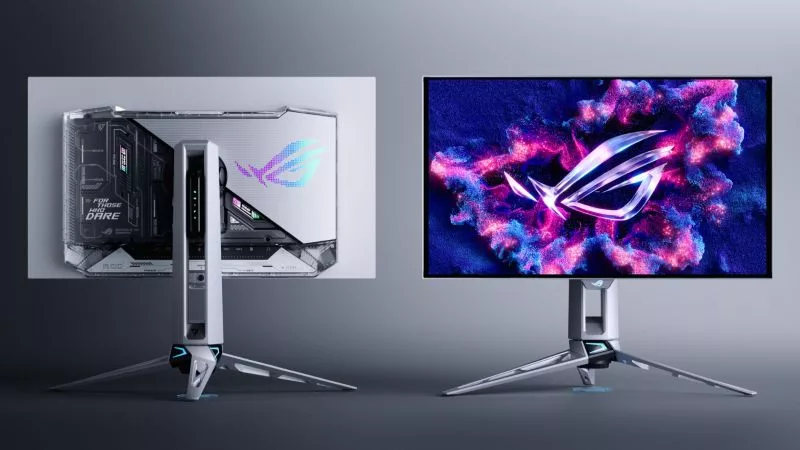
Yes, OLED gaming monitors can work great in sunny rooms. Here’s what to look for
Our new ROG monitors pack the brightness and display coating combo that you need to fight sunlight and play during the day.
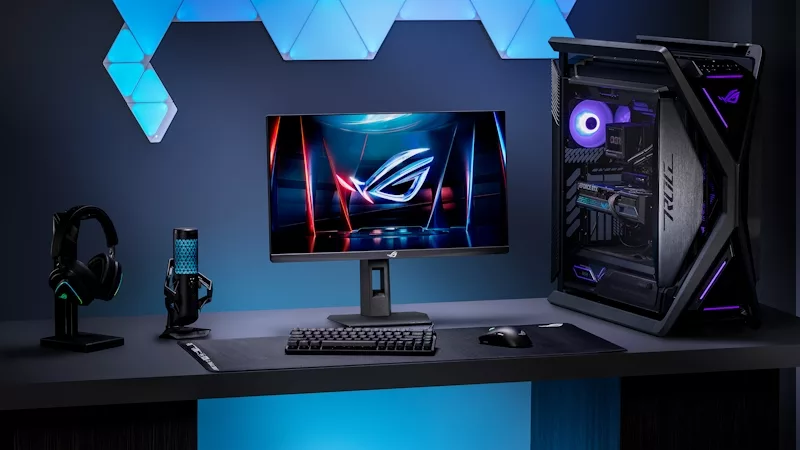
The ROG Strix Ace XG248QSG gaming monitor puts the pedal to the metal with a 610Hz refresh rate
Generations of ROG displays have fueled esports gamers’ need for speed. Meet our latest tournament-grade monitor.
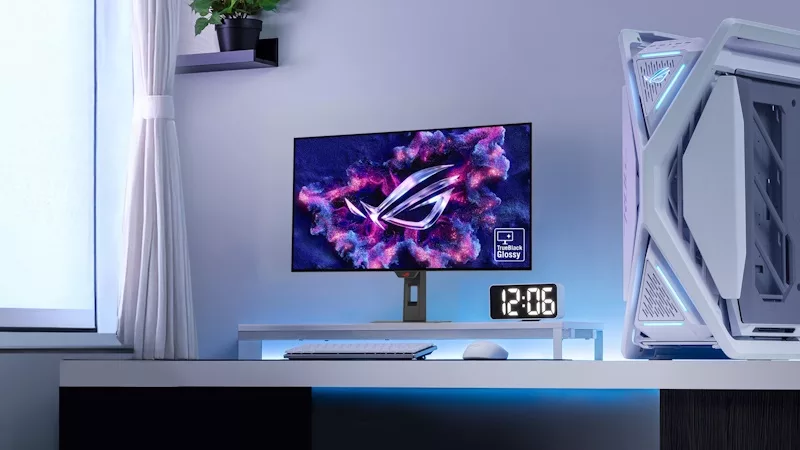
32-inch glossy WOLED panels debut in the ROG Strix OLED XG32UCWMG and XG32UCWG gaming monitors
Get inky blacks in any environment, deft reflection handling, vibrant OLED colors, and great gaming specs in a 32-inch monitor.
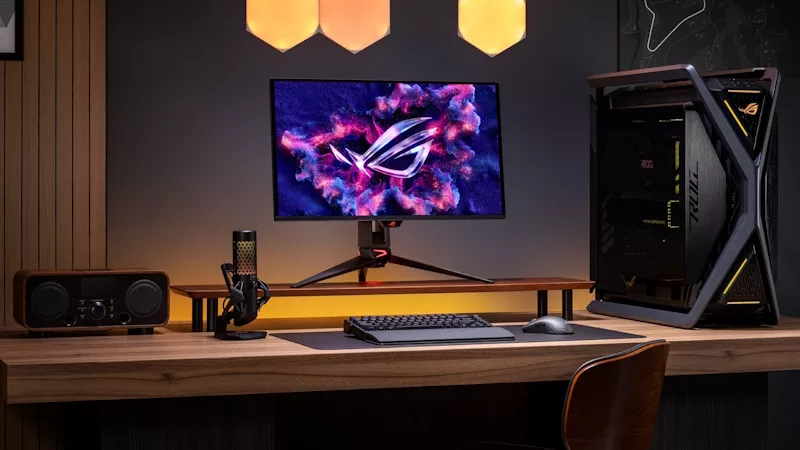
How the Neo Proximity Sensor on the latest ROG OLED monitors improves on its predecessors
The latest ROG OLED monitors feature a new upgrade: the Neo Proximity Sensor. Here's what it offers over previous models.